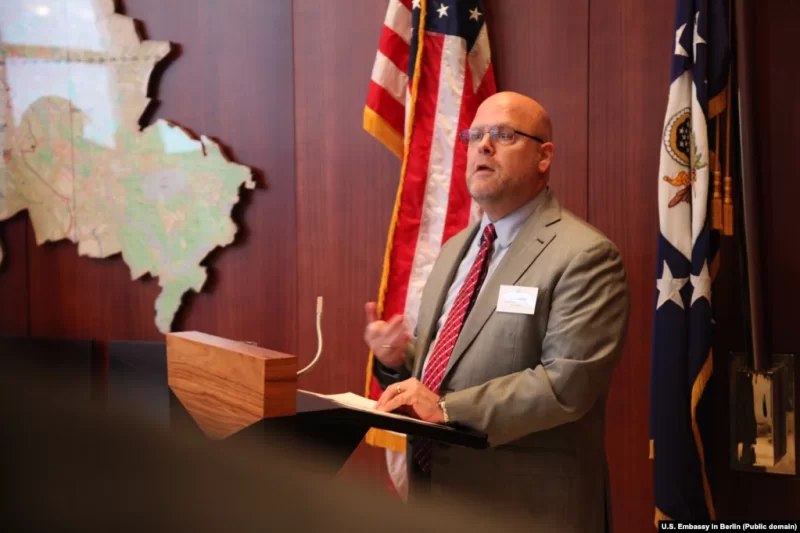Kosovo Agrees To Delay New Travel Rules After Tensions Rise At Serbian Border
Kosovar authorities said early on August 1 that they had agreed to delay implementation of two regulations regarding automobile license plates and travel documents for visitors from Serbia after consultations with U.S. and European Union representatives.
Officials said the new regulations would be postponed for 30 days once barricades set up at border crossings by ethnics Serbs in Kosovo were removed.
Kosovar leaders "have held contacts and meetings with American and European international factors," a government statement said.
"Following this, the Kosovo government has given a pledge to postpone the implementation of the two decisions dated June 29, 2022, until September 1, 2022...from the moment when all barricades are removed and full freedom of movement is established on all roads in northern Kosovo."
Government officials added that the new regulations would continue to be implemented until the barricades were removed by protesters.
Late on July 31, U.S. Ambassador to Pristina Jeffrey Hovenier had urged Kosovo to postpone implementation of the regulations for 30 days "because there seems to be disinformation and misunderstanding of these decisions."
"We hope that we will work with this government and colleagues from the European Union to ensure that these agreements are better understood and thus lower tensions," he added.
Hovenier also called on protesters to remove the blockades and allow traffic to move smoothly, adding that "the right path is through civil dialogue."
The NATO-led mission in Kosovo also said on July 31 that it was monitoring the "tense" situation in the northern municipalities and that it was "prepared to intervene if stability is jeopardized."
On July 31, ethnic Serbs in northern Kosovo blocked roads near two key border crossings with Serbia as tensions rose in the region a day before the two government regulations involving Serbian-issued license plates and ID documents were to come into force.
The Kosovar government had said that starting on August 1 travelers arriving from Serbia would have their Serbia-issued documents exchanged for new entry-exit identification documents issued by Pristina, valid for three months.
The policy matches a long-standing practice in place by Belgrade for Kosovo citizens visiting Serbia.
In addition, a new regulation regarding license plates was also scheduled to come into effect on August 1.
Ethnic Serbs in the north of Kosovo have been using car plates issued by Serbian institutions since the war in 1999 with acronyms of Kosovar cities, such as KM (Kosovska Mitrovica), PR (Prishtina), or UR (Urosevac).
The government in U.S.-allied Kosovo regards the plates as illegal but has tolerated them in four northern municipalities with Serb majorities.
Under the new regulations, Kosovar authorities would require those plates to be replaced by Kosovar-issued plates with the "RKS" acronym for Republic of Kosovo. Car owners will have until the end of September to make the changes.
Late on July 31, Kosovar police announced they had closed the border crossings in Jarinje and Brnjak for travel and vehicle circulation because of the blockades set up by protesters.
"All citizens are notified to use other border points for circulation," Kosovar police said.
The dispute over vehicles erupted in September 2021 after Kosovar authorities ordered all drivers entering Kosovo from Serbia to use temporary, 60-day, printed license plates in response to measures in Serbia against drivers from Kosovo that have been in place since 2008, when the country declared independence from Belgrade.
At that time, Serbs from northern Kosovo blocked the Jarinje and Brnjak crossings with vehicles and makeshift barricades, while Kosovo's government sent in police units and Serbian military jets and helicopters buzzed the border in a show of force.
Serbia does not recognize Kosovo’s independence nor its right to impose rules and regulations such as registering cars and trucks.
Most EU countries recognize Kosovo, though Russia and China, allies of Serbia, do not.
The EU has tried to broker a dialogue between the two Balkans neighbors for over a decade, but so far the efforts have failed to achieve a normalization of ties.
Prime Minister Albin Kurti has said Kosovo will formally apply to become a member of the European Union by the end of 2022 despite concerns over tensions with Serbia, also an EU aspirant
(Source: rfel.org)













